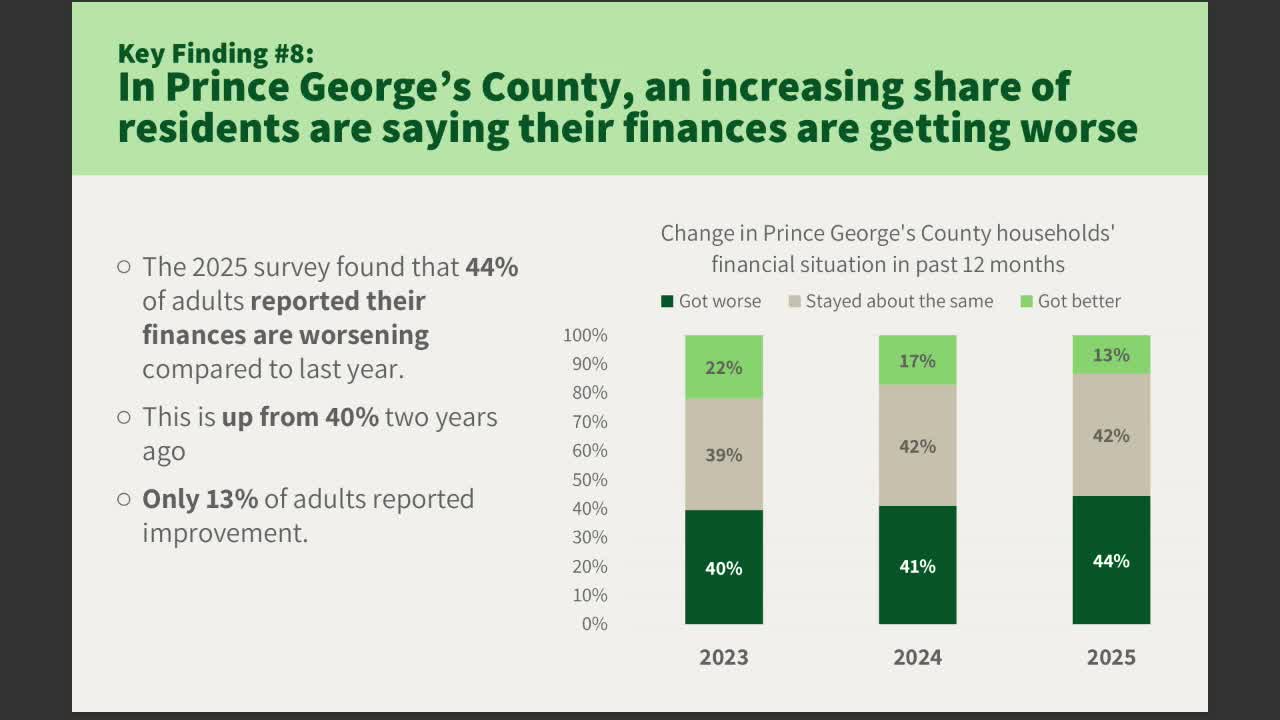Prince George's County Faces Growing Food Insecurity Amid Rising Inflation and Wages Stagnation
October 02, 2025 | Prince George's County, Maryland
This article was created by AI summarizing key points discussed. AI makes mistakes, so for full details and context, please refer to the video of the full meeting. Please report any errors so we can fix them. Report an error »

Inflation's grip on Prince George's County is tightening, with a staggering 21% increase since May 2020, while wages have only risen by 6%. This economic disparity is forcing residents to make tough choices between basic necessities like food, transportation, and utilities. The situation is dire, as 9% of credit card accounts are now delinquent—a 41% increase over the past two years—indicating that many are struggling to keep up with rising costs.
During a recent meeting of the Health, Human Services and Public Safety Committee, officials highlighted the urgent need for action. The food bank and its network of 120 community organizations distribute 17 million pounds of food annually, yet this only reaches 60% of those in need. The committee emphasized the importance of addressing food insecurity and the interconnectedness of Medicaid cuts affecting 100,000 residents in the DMV area.
Three key recommendations emerged from the discussion: First, protect families from cuts to SNAP and Medicaid as federal changes are implemented. Second, empower families to enhance their skills through initiatives like the upcoming College Hunger Summit at Prince George's Community College. Finally, advance programs that promote food as medicine, which could improve community health and reduce healthcare costs.
Council members expressed a commitment to monitor the situation closely and provide support to food pantries and organizations tackling food insecurity. The meeting underscored the pressing need for collaborative efforts to alleviate the economic strain on residents and ensure that no one goes hungry in Prince George's County.
During a recent meeting of the Health, Human Services and Public Safety Committee, officials highlighted the urgent need for action. The food bank and its network of 120 community organizations distribute 17 million pounds of food annually, yet this only reaches 60% of those in need. The committee emphasized the importance of addressing food insecurity and the interconnectedness of Medicaid cuts affecting 100,000 residents in the DMV area.
Three key recommendations emerged from the discussion: First, protect families from cuts to SNAP and Medicaid as federal changes are implemented. Second, empower families to enhance their skills through initiatives like the upcoming College Hunger Summit at Prince George's Community College. Finally, advance programs that promote food as medicine, which could improve community health and reduce healthcare costs.
Council members expressed a commitment to monitor the situation closely and provide support to food pantries and organizations tackling food insecurity. The meeting underscored the pressing need for collaborative efforts to alleviate the economic strain on residents and ensure that no one goes hungry in Prince George's County.
View full meeting
This article is based on a recent meeting—watch the full video and explore the complete transcript for deeper insights into the discussion.
View full meeting
